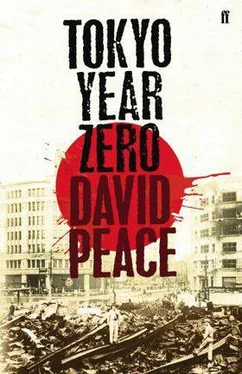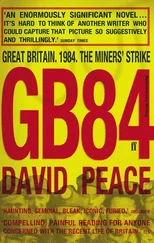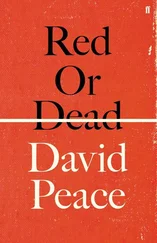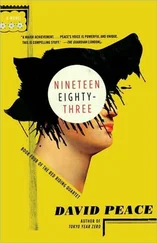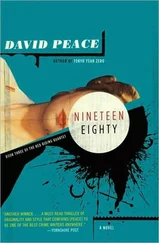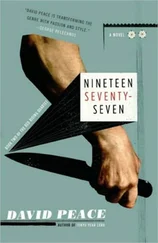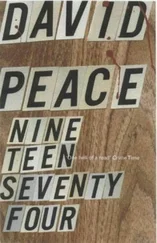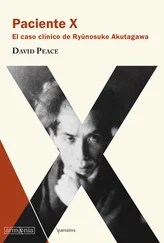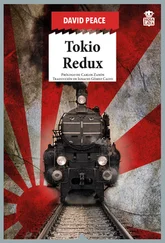Was it Adachi or Senju? Senju or Adachi?
Now they have found Detective Fujita –
Adachi or Senju? Senju or Adachi?
Now they will find me –
Adachi or Senju?
But I have to take a chance; I have to take a chance that they won’t catch Ishida before he leaves Atago, that Ishida will have already left Atago and be on his way back home now for his rice; have to take a chance that Ishida will then go straight to Asakusa, that either Headquarters won’t know what time we’re set to leave Tokyo for Tochigi, or that they won’t think to send anyone to stop us –
Senju or Adachi? Adachi or Senju? Senju or Adachi…
These are the chances I take. The chances I take –
Or was it me? Was it me? Was it me?
I take as I cut and run through Tokyo –
Was it me? Was it me?
The City of the Dead –
The Shōwa Dead…
*
Baba Hiroko was found dead on the third of January this year in Tochigi Prefecture in the jurisdiction of the Kanuma police station. But Baba Hiroko was not from Tochigi Prefecture. Baba Hiroko was from Tokyo. Baba Hiroko lived at 1–9 Shin-Tsukuda Nishimachi, in Kyōbashi Ward with her mother and her uncle, Kobayashi Sōkichi.
I run through Kyōbashi Ward, looking for the street and keeping in the shadows of the old office buildings still standing. I find the street and I walk down it, looking for the address and dodging the sunlight in the empty spaces created by the bombsites –
The shadows and the sunlight, the black then the white…
I come to a battered board fence; a huge pile of rusty iron, a cabin with a glass door and a stained tin roof visible through the gaps in the wood; this place must be 1–9 Shin-Tsukuda Nishimachi –
Behind the fence, an old man in overalls stands in front of the cabin, a handkerchief around his head. I call through the fence. I tell him who I am; Inspector Minami of the Tokyo MPD. He tells me who he is; Kobayashi Sōkichi. He tells me he is Hiroko’s uncle –
I tell him why I’m here and where I’m going –
I ask if I can speak with him. He nods –
I think about her all the time…
I step through an opening in the boarding into the scrapyard. He takes off the handkerchief and wipes his neck. He shows me inside the cabin. He points to a small stool, which is the only piece of furniture in the cabin. He sits down on an empty packing case, an old colour postcard of the Itsuku-shima Shrine still tacked to the wall –
‘Me and this shack is all that’s left,’ says Mr. Kobayashi –
I stare up at the boarded ceiling, still black with winter soot, the blackboard by the window, and now I stare across at the butsudan on which a potted sakaki tree sits before three framed photographs; two are of older women, the third of a much younger woman –
‘Hiroko left here early on the morning of the thirtieth of December last year. Her mother had been evacuated to the employee apartments of the Furukawa Denki copper factory in Nikkō…’
The same company Kodaira twice worked for…
‘But because of the situation here in Tokyo and because of the better standard of living out in the country, her mother was still living up there. Hiroko wanted to spend New Year’s Eve and New Year’s Day with her and she had some gifts to give her…’
‘Do you remember what these gifts were?’
‘There was a red scarf she’d knitted herself, I do remember that. Then I think there were some bits of food and what-have-you. I mean, her mother was probably eating better than us, but Hiroko saved up her rice ration for the whole month…
‘But Hiroko never arrived and then, four days later, her body was found in that field near that mountain in Nishi Katamura, Kami Tsuga-gun. In that lonely field…’
She haunts me…
‘Hiroko had been dragged across the field, her face had been beaten, she had been throttled, she had been raped and then she had been strangled with her own scarf. The murderer had then stolen all her belongings, the two hundred yen she had had with her, as well as her coat and her scarf and all the presents she had for her mother…
‘Hiroko’s mother blamed herself. Her mother felt she shouldn’t have stayed in Tochigi, that if she had returned to Tokyo then Hiroko would never have gone up to Tochigi that day, that she’d never have met the beast that did those things to her…’
‘Where is her mother now?’ I ask. ‘Not still in Tochigi…?’
‘Hiroko’s mother died of the shame and a broken heart…’
‘I’m sorry to hear that,’ I tell him. ‘I’m very sorry…’
‘Whoever killed Hiroko, killed her mother too.’
I nod and I tell him he is right. I ask if I may pay my respects and then, for the second time today, I kneel before a butsudan —
But this time I do not ask for forgiveness –
This time I ask only for guidance –
The guidance for justice –
Justice & vengeance…
I stand back up and he thanks me for my time and he thanks me for my trouble and then he shows me back out of the cabin –
Back out into the sunlight and the scrapyard –
‘My own son is still in Mulchi,’ he says. ‘Least, that’s what they tell me. I’ve heard nothing. But, until I do hear otherwise, while he’s chopping wood on the Amur River, I’ll keep this business going so there’s something for him to come back to…’
But now Hiroko’s uncle stares across the street at the buildings going back up, and he says, ‘Then again, perhaps he’s already just another ghost…’
*
The Ginza Subway Line terminates at Asakusa station in the basement of the Matsuya Department Store. The Tōbu Line starts and finishes on the second floor of Matsuya; Ishida will be there at three o’clock. I look at my watch. Chiku-taku . I am early. I need to keep my distance for now. I come up for air out of the subway –
Ton-ton. Ton-ton. Ton-ton. Ton-ton. Ton-ton. Ton-ton…
But there is no air in Asakusa; just markets to the left, looking north, and ruins to the right, across on the other bank of the Sumida River. There is no air; the same burnt field, flat but for the black scorched concrete and the new yellow wood. No air; this place is death, always death, death before and death again now –
Ton-ton. Ton-ton. Ton-ton. Ton-ton. Ton-ton…
I came here the day after the Great Kantō Earthquake; that day the whole city stank, stank of rotten apricots, and the closer I walked to Asakusa and to the winds that blew across from east of the river, the stronger the stink of apricots became –
Ton-ton. Ton-ton. Ton-ton. Ton-ton…
The stink of rotten apricots that was the stench of the dead, the mountains of dead lain out under a burning sky among the charred ruins on both banks of the Sumida –
Ton-ton. Ton-ton. Ton-ton…
I stood among those corpses piled up high along the riverbanks and the body of one young boy it caught my eye, his body caked black in rags and filth, his face and hands covered in blisters and boils, I wondered where his father was, I wondered where his mother was, his brothers and his sisters, and I prayed that they were dead, better everyone was dead –
Ton-ton. Ton-ton…
Everyone dead –
Ton-ton…
Hammering then and hammering now. Better everyone was dead . Hammering then and hammering now. Better everyone was dead . Hammering then, hammering now –
Better everyone was dead…
Dead then, dead now –
Everyone dead…
Then, twenty-two years after that first fire rose up with the earth, I watched as a second fire rained down from the skies onto Asakusa and Tokyo, borne on a loud wind that swept the fire over the low half of the city, that swept half the people away in its wake –
Читать дальше
